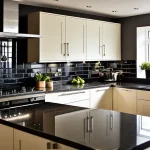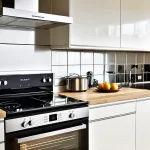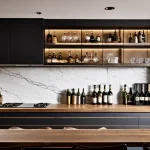The central importance of kitchens in UK home renovations
When it comes to UK kitchens, they hold a pivotal role in the home renovation market. Homeowners consistently prioritize kitchens as the centerpiece of their renovation projects. This focus stems from kitchens being both highly functional and social spaces where families gather, making their design and renovation critical.
In fact, kitchens often represent the largest single expenditure within overall renovation budgets. Research shows that a significant portion of homeowners allocate a major share of their renovation funds to upgrading or remodeling their kitchens. This spending pattern highlights the significance of kitchens in renovations, reflecting their impact on property value and daily life.
In parallel : How do lighting trends impact UK kitchen aesthetics?
The decision-making process too often revolves around kitchen design choices, such as cabinetry, appliances, and layout, emphasizing how central kitchens are in shaping renovation outcomes. Statistics within the home renovation market reveal that over 40% of renovation funds typically go toward kitchen improvements, underlining their dominance in both cost and attention.
By investing wisely in UK kitchens, homeowners not only enhance their living experience but also maximize returns when selling their home. This makes kitchens fundamentally important in the broader context of British home renovations.
Also to discover : How Have British Kitchen Trends Evolved Over Recent Years?
How kitchen renovations affect property value in the UK
Kitchen upgrades consistently influence property value positively in the UK property market. A modern, well-designed kitchen appeals to buyers, often becoming a central factor in their purchase decision. Research shows that investing in kitchen renovations typically offers a strong return on investment, with homeowners recovering a significant portion of the costs upon resale.
UK buyers tend to favour certain kitchen features that enhance both aesthetics and functionality. These include integrated appliances, durable work surfaces such as quartz or granite, energy-efficient lighting, and ample storage solutions. Such upgrades not only improve daily usability but also position the property as more desirable compared to others on the market.
Data from recent UK studies highlights that properties with contemporary kitchens can command up to 10-15% higher sale prices than those with outdated or bland kitchens. This premium is even more pronounced in competitive markets, where presentation can tip the scales.
In essence, strategic kitchen renovations serve as a practical investment to boost property value. UK sellers aiming for optimal sale outcomes should prioritise upgrades that blend style, efficiency, and durability, ultimately catering to typical buyer expectations in the UK property market.
Key drivers of kitchen renovations in UK homes
Kitchen renovations in UK homes are primarily driven by renovation motivation linked to evolving lifestyle requirements and the desire for modernisation. Many homeowners seek to adapt their kitchens to accommodate changes in family size or daily routines. For example, growing families often need more storage and workspace, prompting functional upgrades. Likewise, empty nesters may opt for streamlined layouts prioritising convenience.
Another significant driver is the shift towards open-plan living, which blends kitchen, dining, and lounge areas to better suit contemporary socialising and entertaining habits. This trend highlights how lifestyle changes directly influence renovation choices, encouraging homeowners to create versatile, inviting spaces.
Functional upgrades frequently involve installing energy-efficient appliances, improving lighting, and adding smart technology to enhance usability. Meanwhile, aesthetic motivations focus on refreshing appearances with modern materials, colours, or finishes, reflecting personal style while boosting property value.
In summary, UK kitchen renovations are a balanced response to practical needs and the aspiration for modern, stylish environments that keep pace with current living standards and trends. This combination of functional upgrades, lifestyle adaptability, and modernisation underscores why kitchens often top renovation lists across the UK.
Emerging design trends and innovations in UK kitchens
As kitchen design trends evolve in 2024, the focus sharpens on merging aesthetics with functionality. Sleek, minimalist layouts continue to dominate, emphasizing clean lines and spacious surfaces. More homeowners favor open-plan kitchens that blend seamlessly with living and dining areas, creating versatile, social environments.
Innovation plays a crucial role, especially with the integration of smart technology. Voice-activated appliances, app-controlled lighting, and intelligent refrigeration systems enhance convenience and energy efficiency. Touchless taps and induction hobs exemplify how technology supports both hygiene and precision in cooking.
Sustainability also influences material choices. Recycled and eco-friendly materials like bamboo, reclaimed wood, and low-VOC paints are increasingly popular. These options align with growing environmental awareness while adding unique textures and warmth to kitchen spaces.
Multi-functional kitchens are on the rise, designed to serve as cooking, working, and relaxing zones. This adaptability reflects changing lifestyles where the kitchen doubles as a hub for family interaction and remote work. By combining innovation, smart tech, and sustainable materials, UK kitchens are transforming into efficient, stylish, and eco-conscious spaces fit for modern living.
Case studies and industry insights: UK kitchen renovations in action
Understanding the impact of kitchen renovations is easier when looking at real-world examples. A renovation case study from a London family home demonstrated a 30% increase in property value post-renovation, underscoring the investment value in UK kitchen renovations. Experts note that this trend is driven by growing consumer demand for modern, efficient, and aesthetically pleasing kitchens.
Market analysis across the UK reveals a steady growth, fueled by factors such as increased time spent at home and a focus on sustainable materials. Industry reports show that homeowners prioritize not only design but also energy efficiency and smart technology integration. Expert insights suggest that the next five years will see innovations like AI-enabled appliances becoming mainstream, further increasing kitchen functionality.
Comparative data indicates that while London remains a hotspot for high-budget renovations, northern regions are catching up with affordable yet impactful renovations gaining popularity. These trends confirm that UK kitchen renovations are evolving beyond aesthetics, becoming a pivotal part of home improvement strategies nationwide.




